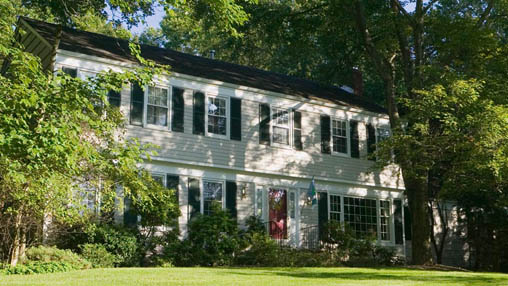
Earn cash back
after close!
With Home Connect, you could earn $350 to $9,500 cash back after close.
A 30-year mortgage has long been the industry norm, and for good reason: It allows homebuyers to spread the loan out over a long period of time and keep payments as low as possible. But now that 30-year mortgage interest rates have started to climb above the record lows seen during the pandemic, the lower rates offered on 15-year mortgages are becoming more popular. But is a 15-year mortgage right for you? Let’s explore its details so you can figure that out.
What Is a 15-Year Mortgage?
A 15-year mortgage is structured to allow your home to be paid off in half the time of the traditional 30-year mortgage. With a 15-year fixed-rate mortgage, your interest rate is locked in, so your payments will remain the same from month to month. Because the period of time you have the loan (the term) is so much shorter, the interest you pay will be cut nearly in half.
Contrary to what some believe, a 15-year mortgage won’t simply have twice the payment of a 30-year mortgage. In many scenarios, your monthly payment may only increase 50% - 60% while the savings over the life of the loan will be substantial. In fact, if your interest rate is 4%, you’d pay almost 2.2 times more interest on a 30-year loan than you would with a 15-year term. As you can imagine, those interest savings increase if you’re getting a lower rate on a 15-year mortgage compared to a 30-year, which is typically the case.
Low Interest Rates Offer You More Options to Consider
Mortgage rates have been historically low in recent years, and even though they have gone up as inflation has increased, they are still comparatively low from a long-term historical standpoint. Scenarios will vary, but often the rate for a 15-year fixed-rate mortgage can be anywhere from 0.50% to a whole 1% lower than for a 30-year fixed-rate mortgage. Your interest rate determines how much you will pay in interest over the life of the loan, and its impact on what you end up paying for your home can be significant.
For example, on a loan of $200,000, a difference between an interest rate of 3% and 4% means a difference in the monthly payment by roughly $843 to $954, or $111. That may not seem like a big difference, but over the course of the 30-year home loan, you’ll pay back approximately an extra $40,000. That’s a lot of retirement money!
There’s even more opportunity for you to save with a 15-year mortgage. Because of the shorter term, less interest accumulates over the life of the loan, and the rate is typically lower than that of a comparable 30-year mortgage. The shorter term does also mean that more principal will need to be paid every month, and this will naturally result in a larger monthly payment.
For example, the payment on a 30-year fixed-rate mortgage with a loan amount of $200,000 at 3.62% would be around $911.52 (not including property taxes and homeowners insurance). By contrast, if you have a 15-year fixed-rate mortgage with the same $200,000 principal amount and a lower interest rate of 2.89%, the monthly payment would be around $1,370.91. So if you can swing the larger monthly payment, you’d save roughly $80,000 in interest over the life of the loan and make 180 fewer monthly payments.
Savings, Cash Flow, and Your Monthly Mortgage Payment
As briefly mentioned above, the interest paid on a loan isn’t the whole story. While today’s rates make the lifetime interest paid on a 15-year fixed-rate loan much lower in comparison to a 30-year fixed-rate loan, you can expect the monthly payment to be higher because you are paying off the same balance in half the time.
The resulting difference between the 15-year versus the 30-year mortgage mentioned above amounts to $460 a month — that can be significant cash flow for most households. If you have the financial stability and savings to comfortably make higher payments throughout the life of your loan, the shorter loan may be a good fit for you.
That being said, some experts advise against investing the bulk of one’s savings into a home because it can limit one’s financial flexibility in the event of an unforeseen personal financial crisis, such as losing a job or falling ill.
Pros and Cons of a 15-year Mortgage
As with any big decision, there are both pros and cons to choosing this type of mortgage.
Advantages of a 15-Year Mortgage
- You May Secure a Lower Interest Rate. Long-term loans are risky for lenders because there’s much more time for a borrower to default on them. While 15 years may not seem like a “short” period of time, it’s half as long as a traditional mortgage and lenders can often offer this type of loan at a lower interest rate because their risk would be lower.
- You’ll Pay Less in Fees. Government-sponsored mortgage holders (such as Fannie Mae) charge fees, commonly called “loan level price adjustments” to borrowers with lower down payments and/or credit scores. However, these fees often don’t apply to 15-year mortgages, and when they do, they’re generally lower than those for 30-year mortgages.
- You’ll Save Money in the Long Run. While the price of the house you’re buying will remain the same whether you finance it for 15 years or 30, you’ll save significantly on interest, as you’ll be paying it over a much shorter period of time.
- You’ll Earn Equity Faster. Equity is based on the payments you make toward the principal of your loan. Because your payments will be significantly higher with a 15-year mortgage, you’ll earn more equity each month than you would with a 30-year loan.
Disadvantages of a 15-Year Mortgage
- You’ll Spend More Money Every Month. This is one of the most notable disadvantages of a 15-year mortgage. Because you’re cutting your repayment schedule in half (as compared to a traditional 30-year mortgage), you’ll pay significantly more each month — albeit for a shorter period of time.
- You’ll Have Less Flexibility. If you have a 30-year mortgage, you can choose to pay extra each month as finances permit. This “extra” amount generally goes straight toward your principal. However, if you have a 15-year mortgage, you’re already paying approximately 50% to 60% more per month than you would with a comparable 30-year mortgage, and you won’t have the ability to stop paying that “extra” amount if finances become tight.
- You Lose Out on Other Investments. If all your money is going into your mortgage, you may not have the liquidity to contribute to other areas that may be important to you — think tax-advantaged 401(k)s, college savings plans for your children, CDs, or the stock market.
- You May Lose Out on Your “Top Choice.” While the low interest rate and reduced repayment schedule often entice buyers to opt for a 15-year mortgage, you may find that unless you go with a 30-year mortgage, you’re priced out of the home you want because the monthly payment is more than you can afford.
When debating between a 30-year or 15-year mortgage, it’s best to consider your own unique situation and the factors that are important to you.
Should I Refinance My 30-Year Mortgage to a 15-Year Mortgage?
If you are already in a 30-year mortgage, you may have the chance to refinance to a lower interest rate. Today’s interest rates offer you the option of further reducing your monthly payment by sticking with a 30-year loan OR shaving years off your mortgage by refinancing to a 15-year mortgage with a lower interest rate . Depending on the interest rate on your current mortgage, you might even be able to refinance to a 15-year loan and keep the same monthly payment.
Let’s evaluate two different scenarios — one where you should refinance, and one where you shouldn’t.
Scenario #1: Sound Financials and a Long Term Plan
You are financially stable. You may have been at your job for years, or you may be retired with a guaranteed pension. You plan on staying in your home for the long term, and you have enough money in an emergency fund to live for a year or more, should your situation change unexpectedly. You have the means to make the higher payments without creating a strain on your lifestyle or existing expenditures, and you have plans in place to save for your future.
In this case: Refinance to a 15-year mortgage. You’ll reap the rewards of a lower interest rate and faster payoff.
Scenario #2: High Earner in an Unstable Job Market
You recently started a new job, you’re making a comfortable living wage and you want a nice home — but the job market is unstable. You don’t want to commit to a lengthy loan term since you may need to relocate for work. While you have an emergency fund, it is not enough to cover your bills and living expenses for a year, and you’re worried about what would happen if you suddenly became unemployed, injured or otherwise unable to work.
In this case: Stick with your 30-year mortgage. You can always pay more than the minimum amount due to pay it off faster, but you’ll have the flexibility to use any extra funds where the money is most needed.
Before making your decision, use online tools such as a refinance calculator to help you evaluate the decision and understand the benefits and risks of each path.
The Bottom Line for 15-Year Loans
With 15-year mortgage interest rates being typically lower than 30-year rates, many homeowners or buyers may be tempted to choose a 15-year mortgage over the more common 30-year mortgage. The 15-year choice enables you to pay off your loan faster and likely lock in a lower interest rate, but it will come with higher payments. To make a smart decision, you need to determine what’s most important to you: financial flexibility or saving on long-term interest and paying off your mortgage faster.
15-year fixed-rate loans are great for borrowers who:
- Have a stable job and income
- Already have a nest egg for emergencies
- Can comfortably make the higher monthly payments
- Want to eliminate their mortgage debt faster
- Can manage the additional risk in exchange for significant interest savings
Still need more information? Whether you’re interested in a traditional 30-year mortgage, refinancing to a 15-year loan or just have questions, we are here for you. Get in touch with a Pennymac Loan Officer today.
Share
Categories
loan types 15-year mortgage fixed-rate loan refinance interest rates mortgages



